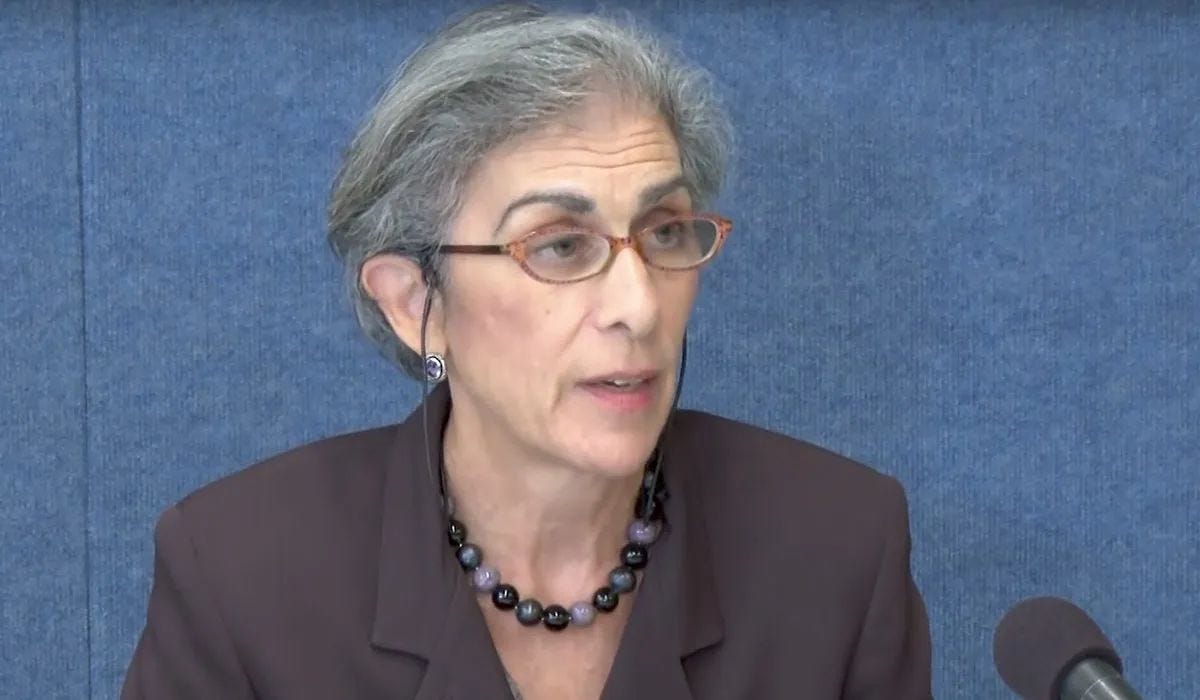Amy Wax's Future Considerably Dimmed
Communication recklessness damages reputation, career and opportunities
Professionals continue to painfully learn that in the present culture freedom of speech does not have as broad of communication latitude as they assume. Some are shocked and offended to be paying a high price for their risk taking and communication errors.
From the PhillyVoice: “University of Pennsylvania law professor Amy Wax will be suspended from teaching for one year after a ruling by the faculty committee (which was tasked with) reviewing her lengthy record of ‘flagrantly unprofessional conduct,’ university officials said.” The ruling finalized two-plus years of of disciplinary review.
That is a powerful finding and determination: “Flagrantly unprofessional.”
To get suspended for one year, bring negative publicity to your employer and self —and have one’s reputation and finances adversely impacted, maybe for years, is a serious punishment.
It’s not quite a termination yet it puts a professional on the thinnest of ice in the heated cultural times where some stakeholders enjoy and pursue the power of seeking punitive reactions and actions.
“Wax, a tenured professor at Penn's Carey Law School, has a history of inflammatory remarks that have included her calling into question the capabilities of Black students and suggesting the country would be better off with fewer Democrat-leaning Asian immigrants,” Michael Tanenbaum reported.
Wax’s punishment includes no summer pay, revocation of her named chair at Penn (rough on the ego) and being required to add a disclaimer for all of her public appearances, clearly mentioning that she’s not speaking as a representative of the university or the Carey Law School. That lost association will hurt Wax’s marketing.
More pain: The public reprimand of Wax will be communicated with the university community in the Penn Almanac, which is the school's weekly publication.
The intense debate about free speech and academia will continue yet with Wax, it appears as if she went beyond responsible expression to communicate sharp-edged personal biases — while representing an employer, a prestigious one — that were experienced in ways that were found to be painful, offensive and highly debatable.
A question to ask is how reasonably probable is it that she overcomes the trust and reputation damage as well as the punishments to her name and professional brand to regain trust and reestablish the strength of her status.
“The chances of Wax overcoming the consequences and regaining trust are slim, especially given the nature of her comments, which directly attack the very students she’s meant to support,” says Oliver Morrisey (photo above), a lawyer, owner and the director at Empower Wills & Estate Lawyers.
“Trust is delicate, and in a teaching environment, it’s even more fragile. The academic community values integrity, respect and intellectual rigor. When someone in Wax’s position makes statements that not only undermine these values but also cause harm, it's difficult to repair that relationship.
The future road forward is going to be a rocky one.
“Rebuilding her professional reputation would require more than just compliance with the university's sanctions; it would demand a sincere acknowledgment of the harm caused and a commitment to re-earning the trust of her peers and students, which may be an uphill battle.”
Another source is in agreement about the future of the aforementioned academic.
“There is little to no probability for Wax to regain trust and reestablish her status, at least not in the same way as before her name was tarnished by these different issues,” says Paul Koenigsberg, a personal injury attorney at Koenigsberg & Associates.
While Wax still gets to work at Penn, Koenigsberg infers that her employment record and name will carry a scarlet letter.
“Even with the university keeping her employed, she will remain associated with the unprofessional conduct attributed to her, and in this age of social media and hyper-polarization, it can be very hard to bounce back from that.”
Wax may prove professionally resilient, although she may have to mute much of what she has previously believed and communicated and would like to communicate in the future, yet her name will not be unstained.
“She may yet redeem herself by staying lowkey for the rest of her career, but her public image will never be the same,” Koenigsberg states.
Wax has unknowingly erected obstacles to her future well being. There are however positives too.
“The university keeping her is at least a good thing. This means Wax may yet have a chance to prove that she is an asset instead of a liability, despite having to endure severe restrictions,” Koenigsberg says.
“Staying at the university will also be in her best interest, as it can be hard for her to find employment elsewhere.”
As for the obstacles:
“Despite her exemplary qualifications, other employers might not want the negative implications of being associated with her,” Koenigsberg forecasts. “With her tenure intact, Wax will remain in the university, but further career growth will be severely limited and she will most probably remain in the shadows for the rest of it.”
Her employers know what stakeholders think and they are not happy with Wax.
“The fact that she was stripped of her named chair and publicly reprimanded suggests the university sees this as a serious breach of professional conduct,” Morrisey states.
“Colleagues may be reluctant to work with her and students may feel uncomfortable enrolling in her courses even after her suspension ends. Furthermore, she risks being perceived as a liability, not just by Penn but by the broader legal community.
“That perception can severely limit her opportunities for speaking engagements, publishing and collaborating on future projects.”
Wax will have to make difficult communication adjustments or risk ending her career in academia and business by becoming a repeat offender and someone the university can no longer employ and businesses no longer feel safe interacting.
“It’s more than just about avoiding inflammatory remarks,” Morrisey says, “but also about understanding the broader implications of her words. The legal and academic worlds are closely linked to social responsibility, and professors, especially those with a public platform, are held to high ethical standards.”
He talks about how her communication will have to develop.
“Wax will need to demonstrate that she can engage in difficult conversations without crossing the line into harmful rhetoric,” Morrisey says. “If she’s unable to shift her approach, the university may have no choice but to reconsider her employment entirely.”
Professional guidance and practice could prove helpful.
“Wax could do better with media training,” Koenigsberg suggests. “I know it can be hard to acknowledge at our age that something as basic as this is needed, but times are changing rapidly, and it's sometimes hard to see if we're successfully going with the tide or not.”
He points out specifically how assistance can help act as insurance for Wax.
“Media training will help her refine her communication skills and learn which opinions to safely air out and which ones to keep to herself,” Koenigsberg points out.
“It may not do a lot to change her perspective on things but at least it might help her zip it when necessary.”
Michael Toebe is a specialist for trust, risk, relationship, communications and reputation at Reputation Intelligence - Reputation Quality. He serves individuals and organizations by helping them further build, protect, restore and reconstruct reputation.
Follow Reputation Intelligence on Twitter/ “X”
Follow Reputation Intelligence on the Medium platform for more stories/insights









